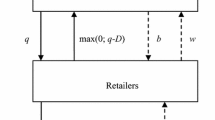Abstract
This paper investigates the negotiation problem in a supply chain in which a supplier can realize cost savings if she reaches an agreement with a retailer to use the retailers accurate market data for production planning. We study the participants behavior in an asymmetric and a symmetric information scenario and model the experimental study as a reverse ultimatum game. The main finding is that the revelation of information in the game leads to higher payoffs for both parties and to a higher welfare.
Similar content being viewed by others
References
Axelrod R (1984) The evolution of cooperation. Basic Books, New York
Axelrod R, Hamilton WD (1981) The evolution of cooperation. Science 211: 1390–1396. doi:10.1126/science.7466396
Cachon GP, Fisher ML (2000) Supply Chain Inventory Management and the Value of Shared Information. Manage Sci 46(8): 1032–1048
Chen F (2000) Information sharing and supply chain coordination. In: de Kok AG, Graves SC (eds) Supply chain management: design, coordination, and operation, vol 11 of handbooks in operations research and management science. Elsevier, Amsterdam
Croson R (1996) Information in ultimatum games: an experimental study. J Econ Behav Organ 30(2): 197–212. doi:10.1016/S0167-2681(96)00857-8
Croson R, Donohue K (2003) Impact of pos data sharing on supply chain management: an experimental study. Prod Oper Manage 12(1): 1–11
Dudek G (2004) Collaborative planning in supply chains. Lecture notes in economics and mathematical systems. Springer Berlin
Dufwenberg M, Gneezy U, Güth W, van Damme E (2001) Direct vs indirect reciprocity: an experiment. Homo Oeconomicus 18: 19–30
Fehr E, Gächter S (2002) Altruistic punishment in humans. Nature 415: 137–140. doi:10.1038/415137a
Gallego G, Huang Y, Katirciogly K, Leung YT (2000) When to share demand information in a simple supply chain?. Working paper, Columbia University, Submitted to management science
Gavirneni S, Kapuscinski R, Tayur S (1999) Value of information in capacitated supply chains. Manage Sci 45(1): 16–24
Gneezy U, Haruvy E, Roth AE (2003) Bargaining under a deadline: evidence from the reverse ultimatum game. Games Econ Behav 45(2): 347–368. doi:10.1016/S0899-8256(03)00151-9
Güth W, Huck S, Ockenfels P (1996) Two-level ultimatum bargaining with incomplete information: an experimental study. Econ J 106(436): 593–604. doi:10.2307/2235565
Güth W, Schmittberger R, Schwarze B (1982) An experimental analysis of ultimatum bargaining. J Econ Behav Organ 3(4): 367–388. doi:10.1016/0167-2681(82)90011-7
Lee HL, Padmanabhan V, Whang S (1997) Information distortion in a supply chain: the bullwhip effect. Manage Sci 43(4): 546–558
Lee HL, Whang S (2000) Information sharing in a supply chain. Int J Technol Manag 20(3/4): 373–387. doi:10.1504/IJTM.2000.002867
Milgrom P, Roberts J (1988) Communication and inventory as substitutes in organizing production. Scand J Econ 90(3): 275–289
Rubinstein A (1982) Perfect equilibrium in a bargaining model. Econometrica 50(1): 97–110. doi:10.2307/1912531
Simatupang TM, Sridharan R (2002) The collaborative supply chain: a scheme for informations sharing and incentrive alignment. Int J Logistics Manage 13(1): 15–30
Thaler RH (1988) Anomalies: the ultimatum game. J Econ Perspect 2(4): 195–206
Yu Z, Yan H, Cheng TCE (2001) Benefits of information sharing with supply chain partnerships. Ind Manage Data Syst 101(3): 114–119. doi:10.1108/02635570110386625
Author information
Authors and Affiliations
Corresponding author
Rights and permissions
About this article
Cite this article
Rief, D., van Dinther, C. Negotiation for Cooperation in Logistics Networks: An Experimental Study. Group Decis Negot 19, 211–226 (2010). https://doi.org/10.1007/s10726-010-9193-7
Published:
Issue Date:
DOI: https://doi.org/10.1007/s10726-010-9193-7




